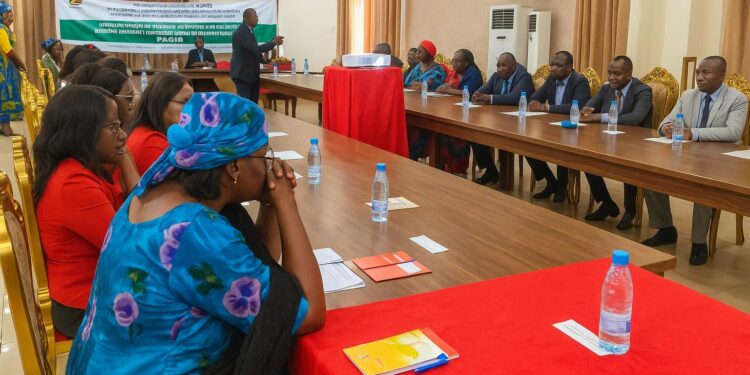Brazzaville validates a decisive technical report
From 12 to 14 September 2025, senior officials gathered in Brazzaville to review a 120-page technical report on procurement data covering July 2024 to June 2025. The workshop, chaired by Director-General of Public Procurement Control Joël Ikama Ngatsé, closed with unanimous adoption of the document.
Data-driven reform gains momentum
Inspectors sifted through national archives and submissions from procuring entities to establish a shared evidence base. “We wanted reliable, mutually accepted figures before reshaping procedures,” Ikama Ngatsé stressed during the opening session. The validation marks the first milestone in a broader digital compliance roadmap.
World Bank partnership underpins the effort
The exercise forms part of the Performance-for-Results window of the World Bank’s Programme for Accelerating Institutional Governance Reforms, or PAGIR. Under this US-backed envelope, disbursements are tied to clear indicators such as processing times, publication rates and independent audit coverage (World Bank 2025).
Key objectives: speed, savings, trust
Reformers target four priority areas: new financial thresholds, simpler planning tools, trimmed approval layers and reinforced ex-ante control. Together, these measures aim to shorten tender cycles, reduce transaction costs and improve the predictability of cash outflows for suppliers and the Treasury alike.
Investor relevance of transparent tenders
International contractors routinely cite opaque award processes as a risk premium in Congo-Brazzaville. Clearer rules could therefore lower bid prices, widen competition and expand local content. Multilateral lenders see transparency as a gateway to syndicated infrastructure deals aligned with medium-term fiscal anchors.
Health and education budgets in focus
The PAGIR programme prioritises social sectors, where procurement lapses translate directly into service gaps. Faster drug tenders and textbook deliveries promise immediate welfare gains. By linking disbursement to measurable safeguards, officials believe they can channel additional resources without straining the sovereign balance sheet.
Measuring progress with granular indicators
The newly validated report lists ninety metrics, from average bid-evaluation days to the share of contracts published on the national portal. Baseline findings show that 38 % of tenders in the sampled year met the legal deadline, suggesting ample room for near-term efficiency gains.
Digital platforms as reform accelerators
Stakeholders agree that a unified e-procurement interface will be essential. The Ministry of Finance plans to pilot electronic notices and bid submissions in 2026, integrating them with treasury and customs databases. Similar platforms elsewhere in Central Africa have cut manual errors and improved audit trails.
Training the procurement workforce
Around thirty officials attended the Brazzaville workshop. Over the coming year, the Directorate will roll out modular courses on category management, risk-based oversight and contract performance. According to facilitators, upskilling staff is the most cost-effective safeguard against collusive practices and unsubstantiated variations.
Balancing control with agility
Reformers emphasise that stronger oversight need not slow project pipelines. By setting higher no-objection thresholds for low-value purchases, the draft decree allows ministries to source routine goods swiftly while reserving strategic scrutiny for complex works and multi-year frameworks.
Private-sector reception so far
Local chambers of commerce welcome the prospect of clearer dispute-resolution mechanisms. “Timely feedback on bid outcomes will let SMEs plan cash flows more confidently,” a Pointe-Noire logistics executive noted on the workshop sidelines. Bankers likewise expect improved collateral valuations once contract award risk declines.
Alignment with regional integration goals
Congo-Brazzaville is harmonising its rules with the Central African Public Procurement Code endorsed by CEMAC members. Convergence is designed to facilitate cross-border turnkey projects and streamline donor co-financing, reinforcing Brazzaville’s reputation as a reliable counterpart in the sub-region.
Fiscal implications under surveillance
While the reforms are cost-neutral at launch, treasury analysts will monitor potential savings from reduced bid prices and fewer contract amendments. Any gains could be redeployed toward priority capital spending, in line with the medium-term expenditure framework.
Timeline and immediate next steps
The Directorate plans to submit an updated draft decree to the Council of Ministers before year-end. Pending approval, a phased roll-out will begin with pilot entities in early 2026, followed by nationwide adoption. Quarterly dashboards will keep stakeholders informed of progress.
Signals sent to development partners
By validating the data underpinning the roadmap, Brazzaville demonstrates commitment to evidence-based policy. The World Bank, IMF and bilateral agencies typically view such milestones as positive triggers for future lending envelopes and technical-assistance pipelines.
Outlook: sustained momentum expected
Observers note that Congo-Brazzaville has maintained a steady pace of public-finance reforms since 2020. The procurement upgrade, anchored in measurable indicators and multilateral support, enhances that narrative. With consistent execution, the initiative could set a regional benchmark for pragmatic, pro-growth governance.












































